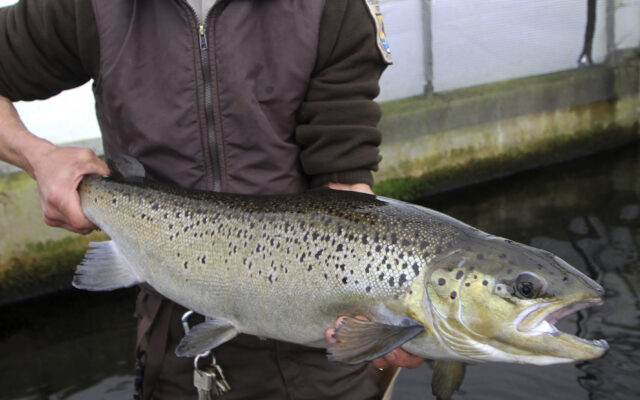
Efforts to restore Atlantic salmon on the Penobscot River awarded $7.5M grant
By Pete Warner, Bangor Daily News Staff
The Atlantic Salmon Federation’s work to help restore the fish to the Penobscot River will receive a big boost thanks to a $7.5 million grant.
The Atlantic Salmon Federation on Dec. 14 announced the influx of funds provided by the Infrastructure and Investment Jobs Act, which will be used for numerous Atlantic salmon-related projects on the Penobscot over the next three years.
The work includes improving fish passage at five dams and removing barriers at 29 road-stream crossings that now serve as barriers to migrating fish.
“We are incredibly honored to receive this grant from NOAA,” said John Burrows, the foundation’s executive director of U.S. operations. “This funding builds on two decades of substantial public and private investment in the restoration of sea-run fish in the Penobscot River. Working with our many great partners, we will now be able to restore access to some of the best habitat in the Penobscot for endangered Atlantic salmon, alewives and other sea-run fish.”
Maine is home to the only native Atlantic salmon populations in the United States, where the fish have been protected under the federal Endangered Species Act since 2000. The fish were for many years a prized catch for sport anglers, who visited the Penobscot in large numbers.
The Atlantic Salmon Federation said the planned work will re-establish access to more than 300 miles of stream habitat and in excess of 10,000 acres of lakes and ponds situated in key tributaries and headwaters of the Penobscot River watershed.
The organization said The Nature Conservancy and the Appalachian Mountain Club will be among the partners that will participate in the projects. Those projects will include removing or replacing 25 stream crossings on roads located on land in Piscataquis County that is owned by the Appalachian Mountain Club.
“Returning Atlantic salmon to the upper reaches of the Penobscot River watershed by restoring access to smaller rivers and streams, such as the Piscataquis and Pleasant Rivers, is a crucial step in revitalizing this endangered species,” said Susan Arnold, interim president and CEO of the Appalachian Mountain Club.
The Atlantic Salmon Federation cited work performed as part of the Penobscot River Restoration Project, which greatly enhanced the return of sea-run fish by eliminating the Veazie, Great Works and Howland dams between 2012 and 2015, as helping pave the way for continued conservation efforts on the river.
“We are excited to continue working in partnership with the Atlantic Salmon Federation, NOAA, the Penobscot Nation and others to realize even more success for fish and people in this vital watershed,” said Kate Dempsey, state director of The Nature Conservancy in Maine.
Implementation of the projects that will be made possible by the grant will involve contributions from numerous groups including the Penobscot Indian Nation, the Maine Department of Marine Resources, the U.S. Fish and Wildlife Service, the USDA Natural Resources Conservation Service, the towns of Danforth and Dover-Foxcroft and private landowners.
Atlantic salmon returns in the Penobscot River were the second highest in 11 years, according to the Maine Department of Marine Resources. An estimated 1,325 Atlantic salmon made their way through the fish lift at Brookfield Renewable’s dam in Milford and the dam in Orono.